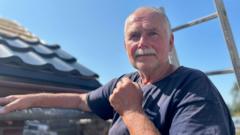“If the old parties had done their jobs properly then the AfD would not exist,” Ingolf complains, echoing a common sense that the rest of Germany looks down on so-called “Ossis” in the east. Far-right Alternative for Germany (AfD) have already won the most votes in regional elections this month in the eastern state of Thuringia. Now Germany’s bracing for a further political shockwave, as polls suggest the AfD could also take the most votes in Brandenburg state's election in a few weeks time.
Tucked away near the Polish border, in the two tiny villages of Jämlitz and Klein Düben, support for the far right has soared. A former conservative (CDU) voter, Ingolf is frustrated about how successive governments have handled education, saying standards were better when he was a boy growing up in the communist German Democratic Republic. He voices anxiety about Germany’s flatlining economy as well as immigration, comparing the far-right riots in England this summer to “civil war-like conditions”.

Disorder that, while nothing like a civil war, has stoked narratives about the potential for violent clashes within multicultural communities. “That’s not what we want here in Germany,” he says. In Jämlitz, most notable for a large goose farm, the idea of civil strife couldn’t feel further away.
Nor could the war raging in Ukraine. But the AfD’s call to stop sending weapons to Kyiv is also resonating strongly. “The money for Ukraine is an issue,” says Yvonne.



















